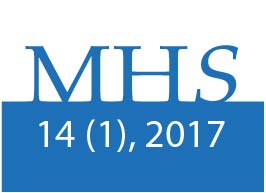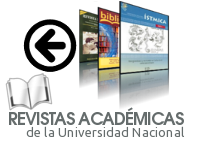Obesity and Self-Regulation of Physical Activity and Eating Behaviors in College Students: A Prospective Study
DOI:
https://doi.org/10.15359/mhs.14-1.4Keywords:
body mass index, physical activity, eating behaviors, studentsAbstract
This study aims to determinate if there are variations in the body mass index (BMI) after the first two years of college life and also to determinate if these variations are influenced by self-regulation. This is a quantitative prospective study from the years 2013 to 2015. We measured 59 Nursing students from a public University in Mexico that were admitted in 2013. We used two scales to asses self-regulation, one for to asses eating behaviors and another for physical activity, and also we used well calibrated anthropometry instruments. The results showed that in women’s group weight, BMI, waist and hip circumference, increased at the final measured as compare to the initial data, while there was a decrease in the hip/waist ratio, the waist and hip circumference and a decrease in self-regulation of eating behaviors. The initial values in self-evaluation of physical activity and eating behaviors are associated with BMI in the last measure (β = 0.353; p = 0.006) and higher initials scores in self-observation of physical activity are prognostic factors of a diminution of the BMI (β = 0.782; p = 0.001). Thus, the findings suggest that lower levels of self-regulation of physical activity are linked to the rise in BMI, which confirms the hypothesis that self-regulation skills are not only useful in the treatment of obesity but also in its prevention.
References
Annesi, J. (2013). Effects of treatment differences on psychosocial predictors of exercise and improved eating in obese, middle-age adults. Journal of Physical Activity and Health, 10(7), 1024-1031. https://doi.org/10.1123/jpah.10.7.1024
Annesi, J., & Porter, K. (2013). Self-Regulatory Skills for Controlled Eating Emanating From Newly Initiated Physical Activity. Journal of Social, Behavioral, and Health Sciences, 7(1), 67-78. https://doi.org/10.5590/JSBHS.2013.07.1.05
Annesi, J. J., Johnson, P. H., & Porter, K. J. (2015). Bi-Directional Relationship Between Self-Regulation and Improved Eating: Temporal Associations With Exercise, Reduced Fatigue, and Weight Loss. The Journal of Psychology, 149(6), 535-553. https://doi.org/10.1080/00223980.2014.913000
Arnett, J. J., & Padilla-Walker, L. M. (2015). Brief report: Danish emerging adults' conceptions of adulthood. Journal of Adolescence, 38, 39-44. https://doi.org/10.1016/j.adolescence.2014.10.011
Bandura, A. (1986). Social foundations of thought and action: A social cognitive theory. New Jersey, EE. UU.: Prentice Hall.
Bandura, A. (1991). Social Cognitive Theory of Self-Regulation. Organizational Behavior and Human Decision Processes, 50(2), 248-287. https://doi.org/10.1016/0749-5978(91)90022-L
Baum, C. L., 2nd. (2016). The Effects of College on Weight: Examining the "Freshman 15" Myth and Other Effects of College Over the Life Cycle. Demography. https://doi.org/10.1007/s13524-016-0530-6
Campos-Uscanga, Y., Argüelles, V., Vázquez, F., & Ortiz, M. (2014). Autorregulación, autoeficacia y orientación nutricional para la disminución del exceso de peso. Revista Argentina de Clínica Psicológica, 23(2).
Campos-Uscanga, Y., Lagunes, R., Morales-Romero, J., & Romo-Gonzalez, T. (2015). Diseño y validación de una escala para valorar la autorregulación de hábitos alimentarios en estudiantes universitarios mexicanos. Archivos Latinoamericanos de Nutrición, 65(1), 44-50.
Campos-Uscanga, Y., Gutierrez-Ospina, G., Morales-Romero, J., & Romo-Gonzalez, T. (2016a). Self-regulation of eating and physical activity is lower in obese female college students as compared to their normal weight counterparts. Eating and Weight Disorders. doi: 10.1007/s40519-016-0338-9. https://doi.org/10.1007/s40519-016-0338-9
Campos-Uscanga, Y., Morales-Ortiz, A., & Argüelles-Nava, v. (2016b). Obesity in female student: ethnicity and self-regulation as predicting factors. Health Behavior and Policy Review, 3(4), 315-322. https://doi.org/10.14485/HBPR.3.4.3
Campos-Uscanga, Y., Lagunes, R., Morales-Romero, J., & Romo-Gonzalez, T. (2016c). Diseño y validación de una Escala de autorregulación de la actividad física. Revista Psicología del Deporte, 25(2), 309-316.
Carraca, E. V., Silva, M. N., Coutinho, S. R., Vieira, P. N., Minderico, C. S., Sardinha, L. B., & Teixeira, P. J. (2013). The association between physical activity and eating self-regulation in overweight and obese women. Obesity Facts, 6(6), 493-506. https://doi.org/10.1159/000356449
Dakanalis, A., Carra, G., Calogero, R., Fida, R., Clerici, M., Zanetti, M. A., & Riva, G. (2015). The developmental effects of media-ideal internalization and self-objectification processes on adolescents' negative body-feelings, dietary restraint, and binge eating. European Child & Adolescent Psychiatry, 24(8), 997-1010. https://doi.org/10.1007/s00787-014-0649-1
Davila-Torres, J., Gonzalez-Izquierdo, J. J., & Barrera-Cruz, A. (2015). Obesidad en México. Revista Médica del Instituto Mexicano del Seguro Social, 53(2), 240-249.
Gateva, A., & Kamenov, Z. (2012). Cardiovascular Risk Factors in Bulgarian Patients with Polycystic Ovary Syndrome and/or Obesity.
Obstetrics and Gynecology International, 306347. https://doi.org/10.1155/2012/306347
Gianessi, C. A. (2012). From habits to self-regulation: how do we change? [Congresses]. Yale Journal of Biology and Medicine, 85(2), 293-299.
Gropper, S. S., Simmons, K. P., Connell, L. J., & Ulrich, P. V. (2012). Changes in body weight, composition, and shape: a 4-year study of college students. Applied Physiology, Nutrition and Metabolism, 37(6), 1118-1123. https://doi.org/10.1139/h2012-139
Halberstadt, J., de Vet, E., Nederkoorn, C., Jansen, A., van Weelden, O. H., Eekhout, I., . . . Seidell, J. C. (2017). The association of self-regulation with weight loss maintenance after an intensive combined lifestyle intervention for children and adolescents with severe obesity. BMC Obesity, 4, 13. https://doi.org/10.1186/s40608-016-0140-2
Hatfield, D. P., Sliwa, S. A., Folta, S. C., Economos, C. D., & Goldberg, J. P. (2016). The critical role of communications in a multilevel obesity-prevention intervention: Lessons learned for alcohol educators. Patient Education and Counseling. https://doi.org/10.1016/j.pec.2016.01.005
Instituto Nacional de Salud Pública. (2016). Encuesta Nacional de Salud y Nutrición de Medio Camino (pp. 149). México: Secretaría de Salud.
Janghorbani, M., Aminorroaya, A., & Amini, M. (2017). Comparison of Different Obesity Indices for Predicting Incident Hypertension. High Blood & Pressure Cardiovascular Prevention, 24(2), 157-166. https://doi.org/10.1007/s40292-017-0186-3
Laska, M. N., Pelletier, J. E., Larson, N. I., & Story, M. (2012). Interventions for weight gain prevention during the transition to young adulthood: a review of the literature. Journal of Adolescent Health, 50(4), 324-333. https://doi.org/10.1016/j.jadohealth.2012.01.016
Matheson, A. (2016). Reducing social inequalities in obesity: complexity and power relationships. Journal of Public Health (Oxf), 38(4), 826-829. https://doi.org/10.1093/pubmed/fdv197
Ng, M., Fleming, T., Robinson, M., Thomson, B., Graetz, N., Margono, C., . . . Gakidou, E. (2014). Global, regional, and national prevalence of overweight and obesity in children and adults during 1980-2013: a systematic analysis for the Global Burden of Disease Study 2013. Lancet, 384(9945), 766-781. https://doi.org/10.1016/S0140-6736(14)60460-8
Ogunbode, A. M., Ladipo, M., Ajayi, I. O., & Fatiregun, A. A. (2012). Obesity: An emerging disease. Nigerian Journal of Clinical Practice, 14(4), 390-394. https://doi.org/10.4103/1119-3077.91741
Partridge, S. R., Juan, S. J., McGeechan, K., Bauman, A., & Allman-Farinelli, M. (2015). Poor quality of external validity reporting limits generalizability of overweight and/or obesity lifestyle prevention interventions in young adults: a systematic review. Obesity Reviews, 16(1), 13-31. https://doi.org/10.1111/obr.12233
Pope, L., Hansen, D., & Harvey, J. (2016). Examining the Weight Trajectory of College Students. Journal of Nutrition Education and Behavior. https://doi.org/10.1016/j.jneb.2016.10.014
Rust, G. (2017). Choosing Health Equity: Investing in Optimal and Equitable Health for All. American Journal of Public Health, 107(3), 361-363. https://doi.org/10.2105/AJPH.2016.303645
Salehi, A. M. M. P., Marzban, M. M., Sourosh, M. P., Sharif, F. P., Nejabat, M. M., & Imanieh, M. H. M. (2017). Social Well-Being and Related Factors in Students of School of Nursing and Midwifery. International Journal of Community Based Nursing and Midwifery, 5(1), 82-90.
Tempels, T., Verweij, M., & Blok, V. (2017). Big Food's Ambivalence: Seeking Profit and Responsibility for Health. American Journal of Public Health, 107(3), 402-406. https://doi.org/10.2105/AJPH.2016.303601
Walker, M., Thornton, L., De Choudhury, M., Teevan, J., Bulik, C. M., Levinson, C. A., & Zerwas, S. (2015). Facebook Use and Disordered Eating in College-Aged Women. Journal of Adolescent Health, 57(2), 157-163. https://doi.org/10.1016/j.jadohealth.2015.04.026
Zimmerman, B. J. (1989). A social cognitive view of self-regulated academic learning. Journal of Educational Psychology, 81(3), 329-339. https://doi.org/10.1037/0022-0663.81.3.329
Downloads
Published
How to Cite
Issue
Section
License
General conditions
MHSalud: Journal in Human Movement Sciences and Health by the Universidad Nacional is cover under a Creative Commons Atribución-NoComercial-SinDerivadas 3.0 Costa Rica license.
The journal is hosted in open access repositories such as the Institutional Repository of the Universidad Nacional, the Kimuk Repository of Costa Rica and La Referencia.
The editorial source of the journal must be recognized. Use the doi identifier for this purpose.
Self-archiving policy: The journal allows the self-archiving of the articles in their peer-reviewed version, edited and approved by the Editorial Board of the Journal to be available in Open Access through the Internet. More information in the following link: https://v2.sherpa.ac.uk/id/publication/25815



















